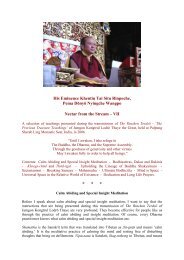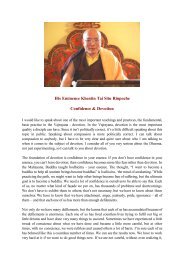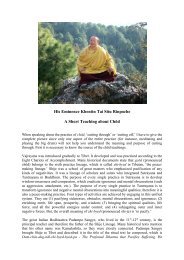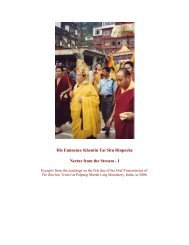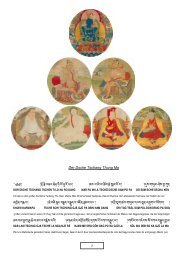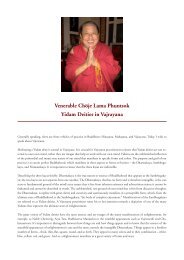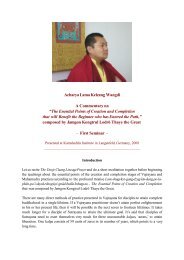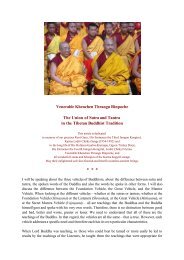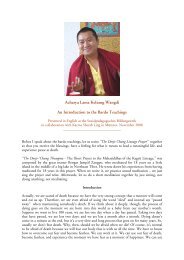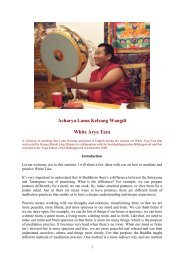You also want an ePaper? Increase the reach of your titles
YUMPU automatically turns print PDFs into web optimized ePapers that Google loves.
ealize karma (“the infallible law of cause and effect”), then we will see that our presentsituation is based upon our past actions. Trusting that this applies to our next life inspires us toaccumulate positive karma by acting virtuously now so that we will have favourableconditions and good opportunities in our next life.We are free to lead our lives according to the instructions our <strong>Lama</strong> presents, byacknowledging how invaluable the basis of our life (which is our human body that is endowedwith favourable conditions) actually is, by un<strong>de</strong>rstanding the meaning of impermanence and<strong>de</strong>ath, and by respecting the law of karma. Contemplating these preliminary practices ofhaving attained a precious human life, impermanence, and karma, we have prepared theground to engage in meditation.There was a Lojong teacher named Karak Gomchung, who lived approximately 1000-1100C.E. He spent much time meditating in a cave that became overgrown with a thorn bush moreand more each year. Karak Gomchung became entangled in the thorn bush every time he hadto leave his cave to use the outhouse. He thought that he would need to tear it down so that hecould go outsi<strong>de</strong> when he nee<strong>de</strong>d to without trouble, but he looked at the thorn bush andthought, “Why bother? Maybe I’ll be <strong>de</strong>ad tomorrow.” So he didn’t do anything and just leftit, but he had to make his way past the thorn bush every time he nee<strong>de</strong>d to leave his cave. Hecontemplated impermanence and <strong>de</strong>ath every time he went outsi<strong>de</strong>, and for years and years hewon<strong>de</strong>red whether he should saw it down or not. Karak Gomchung became a Mahasiddhabecause he contemplated impermanence and <strong>de</strong>ath so intensively due to the bush. JetsünMilarepa practiced in the same way in that – not fearing impermanence and <strong>de</strong>ath – hefocused all his attention on practicing and achieving the changeless state of Mahamudra.Maybe we cannot practice as diligently as Karak Gomchung and Jetsün Milarepa, but we arepracticing the Dharma when we contemplate impermanence and <strong>de</strong>ath. By contemplating thetruth of impermanence again and again, anything that happens to us – joyous or frustrating, atwork or at home – does not affect us as strongly. By contemplating the truth of impermanenceand the law of karma again and again, we see that any pleasant and unpleasant experiencesthat we have are due to our own actions and that they change. If contemplated well, we willbe less involved with temporary and transitory experiences and things. Therefore theteachings state that impermanence is our best friend. Being aware of impermanencediminishes our fear, diminishes our attachment, diminishes our wants and needs, andincreases our wish and enthusiasm to practice.Looking at the difference between disciples who practice and those who don’t: Someone whopractices is aware of the fact that all situations in this life - any unpleasant situations as wellas suffering and pain – change and do not last. Practitioners are also aware of the infalliblelaw of karma. Non-practitioners, who usually become fearful when they contemplateimpermanence, suffer very much when things don’t work out for them or when they are sick.Jetsün Milarepa’s disciples once asked him, “Whose emanation are you? Are you anemanation of Vajradhara Buddha or the reincarnation of a Bodhisattva? Whose Tulku(‘incarnation’) are you?” Uprooting their wrong view that it isn’t possible to attain realizationin a single life time, the Jetsün replied, “No, I am not an emanation of Vajradhara and I amnot the reincarnation of a Bodhisattva. My realization arose from my <strong>de</strong>votion and <strong>de</strong>dication.My karma was very negative. I killed many people when I was young. Then I realized thetruth of karma and practiced with great joy and diligence.” He told his disciples, “It’s possibleto attain realization in one lifetime if you practice.”



